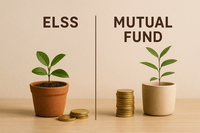Mutual Funds vs Stocks: Key Differences, Risks, and Taxation Explained

When you hear people talk about investing, two names show up often. One is stocks. The other is mutual funds. For many students or job seekers, both sound exciting, but also a little confusing. You may wonder what makes them different, or which one to choose. Let’s walk through this together and make things clear, step by step, in a way that feels simple and friendly.
Starting with Stocks
Think of a stock like a slice of pizza. When you buy a slice, you own that piece. If the whole pizza becomes more valuable, your slice is worth more too. But if the pizza burns in the oven, your slice loses value. That is how stocks work.
A stock is part ownership of a company. If you buy one share of a company, you now own a tiny piece of it. When that company does well, the price of your stock can go up. But if the company faces trouble, the price can fall. This means stocks can give you high rewards, but they also carry high risks.
For a student or a young worker, the thought of owning a part of a big brand may feel exciting. You could say you own a slice of the world’s progress. But you must also be ready for ups and downs. Prices of stocks can move fast, like a roller coaster ride.
Stepping into Mutual Funds
Now let’s imagine you walk into a food court instead of buying a single slice of pizza. Here, you can taste small pieces of many dishes. A little rice, some noodles, maybe even dessert. All of it in one plate. That is what a mutual fund looks like.
In a mutual fund, you do not buy just one stock. Instead, your money is pooled with money from many other investors. A fund manager, like an expert chef, decides which stocks, bonds, or other assets should be added to the plate. So instead of one risky slice, you get a mix.
This pooling makes mutual funds safe compared to holding just a few stocks. Your gain or loss is shared across many companies. If one does badly, others may still do well, and balance things. For someone just starting, mutual funds can feel less scary. They do not need you to track each company every day.
Key Differences Between Mutual Funds and Stocks
The difference between mutual funds and stocks lies mainly in control and risk. Stocks put you right in the driver’s seat. You are directly deciding what to buy and when to sell. You watch the charts, read the news, and take action yourself.
Mutual funds hand the wheel to someone else. A trained fund manager drives, and you sit back. This feels calmer for many beginners. Yet, you also give up some control, and you pay a fee for the expert’s work.
Another difference is how risk plays out. In stocks, all your eggs may sit in one basket, like putting your savings on just one company. If that basket falls, you feel the pain. In a fund, your eggs are spread out across many baskets. The fall of one does not break them all. Kubera wealth reminds you this spreading of risk is called diversification. It is one of the biggest strengths of a mutual fund.
So when we do a mutual funds and stocks comparison, think of it like this: choosing stocks is like climbing a mountain on your own, while mutual funds are like trekking with a guide and a group. You can go faster alone, but there is more danger too.
Looking at Risks
Risk is an important word in investing. With stocks, there are two big risks. One is market risk. Prices may rise and fall daily. If you need money in a hurry, you might have to sell at a loss. Another risk is company risk. If the company you invested in fails, your stock can lose almost all its value.
Mutual funds reduce these risks but cannot remove them entirely. Since they hold many stocks together, one company’s fall does not destroy the whole fund. But funds too move with the market. If the whole economy struggles, both stocks and mutual funds go down.
As a student or job seeker, this means you should think of risk like weather. A single stock can be like walking without an umbrella in a storm—you may get drenched. A mutual fund is like sharing a shelter with others. You may still feel the wind, but you are not completely exposed.
Tax Rules You Should Know
Now let’s talk about taxes, because no investment is free from them. Taxation is another part of the key differences mutual funds stocks guide.
When you sell a stock and make profit, that profit is called capital gain. If you sell it within one year, it is called a short-term capital gain. In India, that means a 15% tax on your gain. If you hold the stock for more than a year, it is long-term capital gain. Over one lakh rupees of gain in a year is taxed at 10%.
Mutual funds follow a similar pattern, but each type has its own rule. Equity mutual funds, which invest mostly in stocks, have the same tax treatment as shares. Debt mutual funds (which include bonds and similar assets) have different rules. As of new updates, gains from debt funds are taxed as part of your income, at the rate of your income slab.
For someone young in their career, it helps to know this early. Kubera wealth likes to remind that planning taxes is as important as planning profits. You do not want to be surprised later.
How to Choose Between Them
Now that we see the mutual funds vs stocks story from every side, how do you decide?
If you love reading about companies, tracking markets, and making quick choices, stocks may suit you. They let you test your analysis and decision-making. It feels like driving a fast bike. You control the speed and the turns, but you must wear safety gear.
If you want a calmer path, consider mutual funds. Here, you let experts take charge, while you focus on your work or studies. It feels like sitting in a train. It moves slower, but its path is clear, and you can look out the window without worry.
When we do a mutual funds and stocks comparison, it is not about one being “good” and the other “bad.” Both are excellent investment options in India. The choice depends on your time, your skills, and your comfort with risk.
Some people even use both. For example, one may put most money in mutual funds for safety, but also buy a few stocks to learn and enjoy the thrill. This mix can give balance.
Easy Examples for Students and Job Seekers
Imagine you just got your first job and saved ten thousand rupees. You could use it to buy shares of one company you trust. Let’s say a mobile phone brand. If the brand grows, your return could be huge. But if it has a bad year, you lose.
If you placed the same amount in a mutual fund, you may own slices of twenty or thirty companies at once. Even if the phone brand drops, other companies inside the fund may do well. Your loss is softened.
This small scene shows the difference between mutual funds and stocks in real life. One is sharp, risky, and thrilling. The other is calmer, spread out, and steadier. Both play big roles in building wealth in India.
Final Thought
Investing feels like standing at a crossroads. You can go left toward stocks or right toward mutual funds. Both paths lead somewhere, and both can teach you lessons. The goal is not to find the single “perfect” path, but to grow in confidence as you walk.
Every student and job seeker should know this: it is okay to begin small. Start with an amount you can afford, even a few hundred rupees. Learn from it. Adjust as you go. You are not expected to know everything now.
Kubera wealth believes that investing is less about speed and more about patience. Seeds become trees with time, care, and trust. Wherever you stand today, remind yourself that you can shape your financial journey, step by step.
So breathe easy. Smile at your progress. Your future is waiting, and you are capable of building it.





















